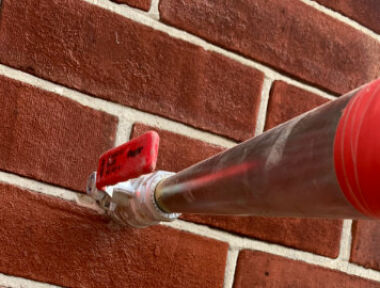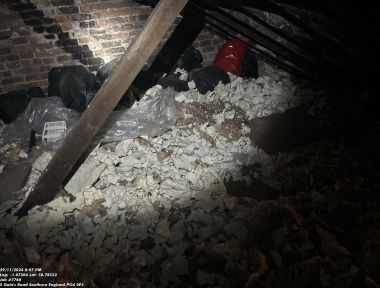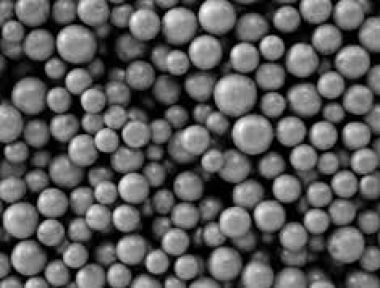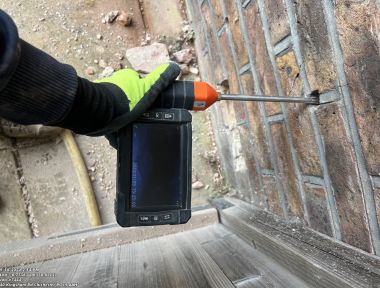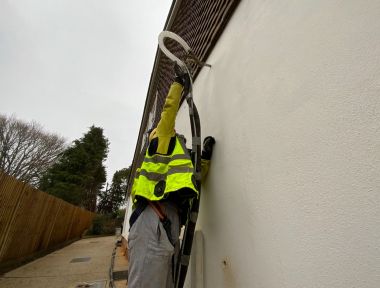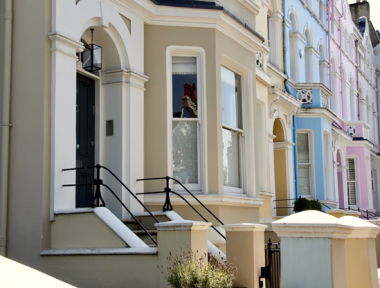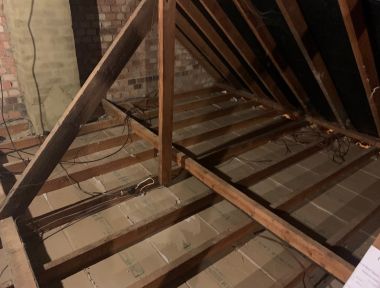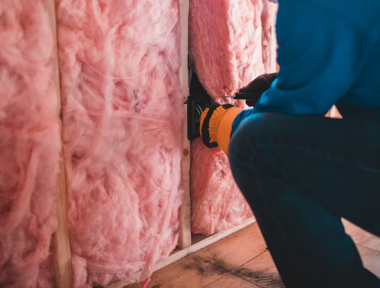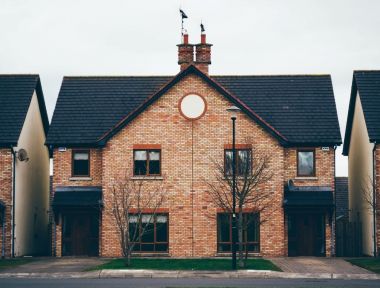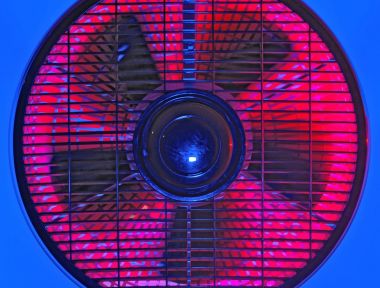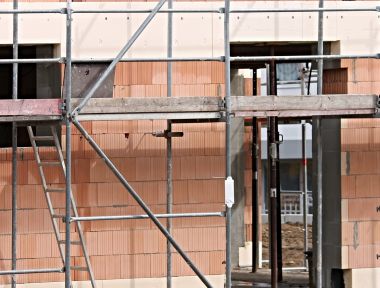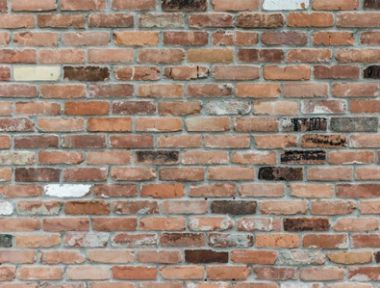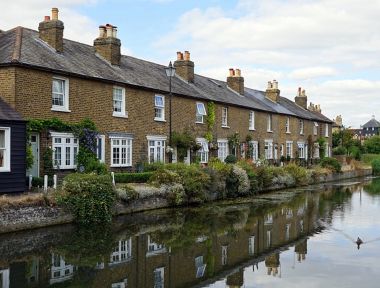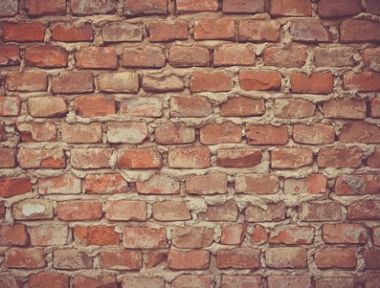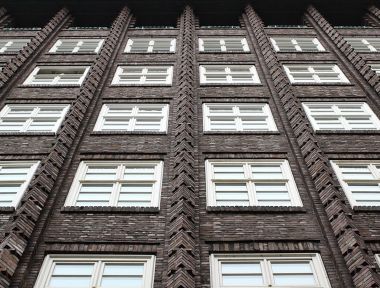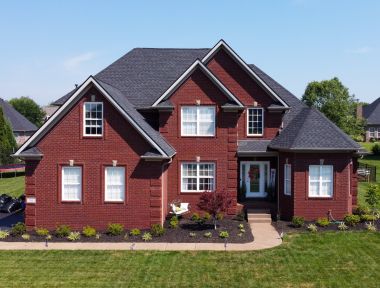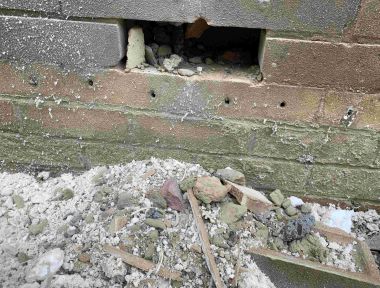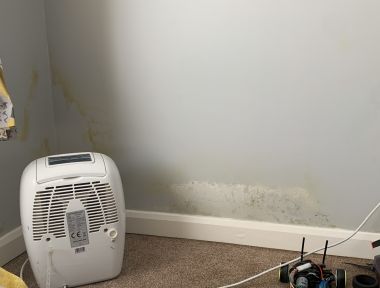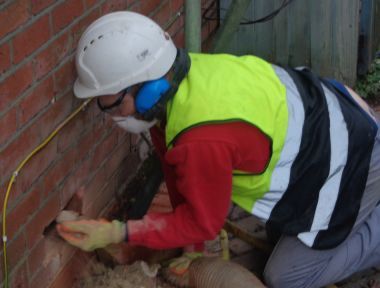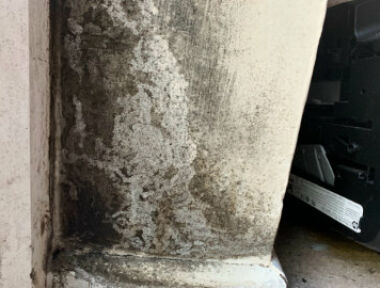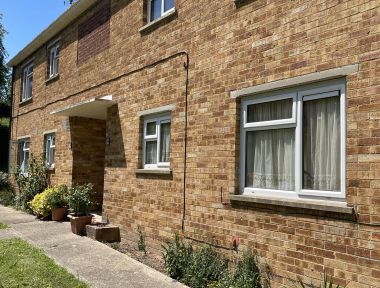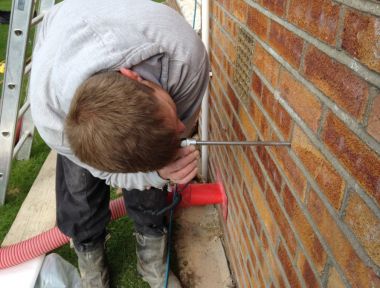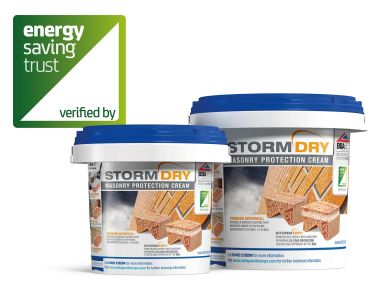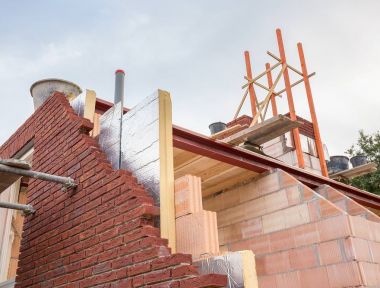Want to know the benefits of cavity wall insulation and how much it will cost you?
About a 1/3 of the heat lost from your home disappears through the uninsulated cavity walls. That's a significant proportion of your energy bill. So, if you insulate your walls, you'll save money and do your bit for helping the environment & planet.
Houses built from 1920 onwards will have cavity walls. But, how are they constructed? A cavity wall has two leaves of brickwork separated by a cavity, and the two leaves are held together with wall ties.
Its purpose is to prevent dampness from wind-driven rain from travelling from the outside surface to the inner plastered and decorated cover. Having a cavity precludes the onset of the various types of dampness common in houses older than this. To a certain extent, it also provides a degree of heat insulation as air is a worse heat conductor than brick.
However, to further insulate your walls, a specialist approved contractor injects one of the following materials into the cavity through small drilled holes.
- Polystyrene beads
- Mineral wool
- Rockwool
Afterwards, the insulation contractor seals the holes with cement mortar.
How Much Does Cavity Wall Insulation Cost?
The cost of cavity wall insulation will vary depending on the size of your home. But, no matter how large your home is, you can usually recoup the insulation cost in about five years from the savings in your energy bills.
To put it in figures you can understand, it will cost about £12 m2 depending on the insulating material, glass wool is the cheapest. So, if you own a typical three-bedroom property in the UK, it'll usually cost between about £800 and £1200 in total.
To look at this in more detail, let's look at some more average estimated cavity wall insulation costs.
Type of house Estimated cost
Mid terraced £600 to £800
Semi-detached £800 to £1200
Detached At least £1200
Detached bungalow About £700
Unfortunately, if you live in a flat, it's a bit more complicated because your neighbours must also agree to share the cost.
House Cavity Insulation Cost Factors
A few factors determine the wall insulation costs and the type of insulation to install in your walls.
Wall type
Houses built before 1900 have solid walls that aren't suitable for cavity wall insulation. Homes built from about 1920 onwards will have cavity walls. The cavity should be a minimum of 50mm across and extend around the entire house above the damp proof course level and free from rubble.
Insulation material
Polystyrene beads are white, grey or black granules and are the best insulator—they cost from £18 to £22 per m2.
How Long Does The Job Take?
The entire job doesn't take very long to do, but it's worthwhile knowing the steps so you can appreciate what happens.
Preparation
- Confirm you need insulation. If you already have insulation, you may need it removed if an older foam that doesn't meet standards today. Get a specialist borescope surveying company to drill a hole and insert a borescope camera. A borescope is a small camera and light source on the side end of a fixed wand. The boroscope can be inserted through a pre-drilled hole into the cavity. The assessor can then inspect the cavity wall and whatever is inside. The report will detail the condition of the cavity and whether it is suitable for injected insulation. Some wall types, those without a cavity or timber-framed buildings, will not suit cavity wall insulation.
- We will check the condition of the walls and repair any obvious cracks or holes that might allow the insulation to escape the cavity.
Insulation
- Drill 22mm holes at 2–metre horizontal intervals along the wall.
- The insulation nozzle on a hose will be inserted into the holes.
- Inject the insulation into each hole, in turn, keeping an eye on the back pressure.
- When the wall is full of insulation, fill the holes with cement mortar and tidy up the area.
Completion
- We will issue an independent 25 Guarantee.
How Much Can I Save On Energy Bills?
This depends on what type of insulation you decide to use and the kind of property—For example, a small bungalow will cost about £700, and you'll potentially save about £120 per year. While a detached house will cost about £1200 and you'll save about £350 per year. On average, however, you can usually make your money back in about five years or so. And, considering that the insulation doesn't usually need replacing for a very long time, this sounds like a good investment.
Cavity Wall Insulation Cost Q&A
- Is there financial help towards having your walls insulated?
If you receive certain income-related or disabled benefits, there is money available to help with the cost.
- How long does cavity wall insulation last?
The National Insulation Association and the Cavity Insulation Guarantee Agency (CIGA) both represent their members consisting of manufacturers and installers. CIGA issues an independent 25–year guarantee for cavity wall insulation installed by registered installers who are also members.
Usually, cavity wall insulation lasts anywhere from 25 years.
- Will cavity wall insulation stop damp?
Damp caused by cavity wall insulation is very rare, but it does happen. Usually, it occurs if there's a combination of the following factors.
- The weather in your area is such that the house is exposed to severe wind-driven rain. Usually, this is in Northern Ireland, most of Wales, most of Scotland and the west of England.
- You haven't got any trees or other buildings to shelter your building, and you live in an exposed location.
- Your external walls are in poor condition, poorly built or sloppily maintained. Usually, this shows cracks in the brickwork or render.
- How do you fix dampness in cavity wall insulation?
Houses with cavity wall insulation will usually become damp if the outside brick leaf isn't weatherproof and the damp condenses onto the insulation within the cavity. There are two methods you can use to fix this problem.
- A resin-based textured wall coating for external walls. Firstly, the contractor does all visible repairs such as cracks, holes, loose rendering, repointing, etc. Then, apply the exterior coating. Your walls will be weatherproof and won't usually need painting for 20 to 25 years. Depending on the brand you choose, you'll also receive a guarantee for about 20 years.
- A damp proof wall coating. This application protects the outside wall from rain. And, as it's colourless, it won't change your home's appearance. This is especially important if you live in a listed building.
- What happens when cavity wall insulation gets wet?
If you have poorly maintained walls or the cavity wall insulation isn't installed correctly, you can often experience condensation and damp penetration. The rain soaks through the outside bricks and reaches the edge of the cavity getting the fibreglass insulation wet causing dampness on the inside walls.
- Can I remove cavity wall insulation myself?
No, A specialist company like Extract Insulation will require you to know the procedures and have specialist equipment. Also, it's challenging to find a waste site that will accept a large amount of insulation material.
Bricks must be removed at intervals along the wall, and the insulation removed using a large and powerful vacuum machine. If you have mineral or glass fibre insulation, the vacuum machine sucks the fibres out of the cavity. However, if you have polystyrene beads or urethane foam, you must first break up the solid mass using a specialist machine before it's vacuumed out.
- How much does cavity wall insulation removal cost?
This cost will vary depending on the type of insulation you wish to remove. On average, however, the price is between £20 and £25 per m2. For a typical semi-detached house of about 80m2, the price will be about £1,600 to £2,000 plus VAT. Remember, you'll have to pay a bit more if you live in London.

